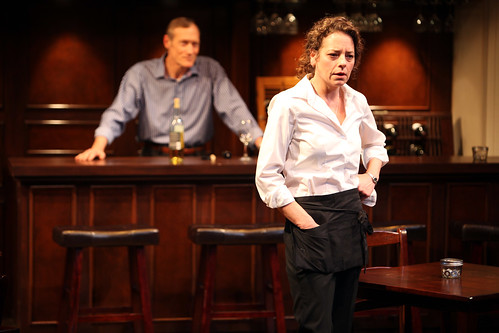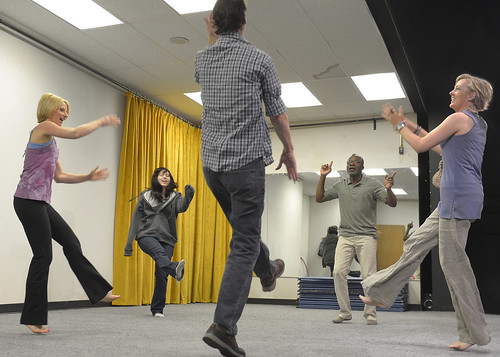
Patrick Breen (left) is Ned Weeks and Matt McGrath is Felix Turner in the American Conservatory Theater production of The Normal Heart by Larry Kramer. Below: A newly formed gay men’s health organization is swamped with calls and overwhelms its volunteers played by (from left) Tom Berklund, Sean Dugan, Michael Berresse and Nick Mennell. Photos by Kevin Berne
In some ways, Larry Kramer’s landmark play The Normal Heart is just a lot of yelling. Characters don’t simply raise their voices, they scream, sometimes from the depths of their souls. And that’s what makes this drama profoundly affecting rather than just loud. These characters have good reason to yell. Some do it from rage, some from fear, some from frustration, some from all of the above combined with grief and utter exhaustion.
To watch The Normal Heart, especially the stunning production directed by George C. Wolfethat opens the American Conservatory Theater season, is to experience a particularly dark chapter in American history – one that, in many ways, continues to this day. Rooted in the early years of the AIDS crisis (before the name AIDS, which is never uttered in the play, existed) in New York City, the play is Kramer’s primal scream for action from a government – city, state, federal – ignoring the growing epidemic and action from members of the gay community themselves to make responsible, possibly life-saving changes in their behavior.
If Kramer’s 1985 play was never regarded as a great dramatic work, Wolfe’s production, which won the Tony Award for best revival last year, goes a long way toward correcting that, finding the emotional heart of the story and elevating to the level of the politics and hysteria. Essentially a work of autobiography, the Kramer stand-in is Ned Weeks, played with the necessary balance of ferocity and compassion by the remarkable Patrick Breen, a writer who is seeing too many of his friends dying from a mysterious plague.

He and several friends form a nonprofit to raise money and attention, but in the absence of either, they’re left performing duties that the medical establishment and government should be providing – like offering, as limited as they are, answers, resources and sympathetic ears. Internal and external politics buffet the group to the point of destruction, but what’s really interesting about Kramer’s play, and what makes it so astonishing in ways beyond its historical impact, is the way it cuts to the heart of the gay struggle.
Ned’s closest relationship is with his brother, Ben (Bruce Altman), a successful lawyer. The brothers are close, but when it comes right down to it, as Ned finds out during a momentous fight, that the central issue always comes down to dignity. If the world – even allies like Ben – still see gay people as less then or damaged, there can be no equality. “You’ve got to say it. I’m the same as you. Just say it. Say it!” Ned screams. “No, you’re not. I can’t say it.” Ben responds.
“My agreeing you were born just like I was born is not going to help save your dying friends,” Ben says. “Funny – that’s exactly what I think will help save my dying friends,” Ned says before telling his brother that they can no longer speak.
That notion of dignity, of equality, of self-respect is like an electric current under the production. If gay men and women didn’t have to fight for those things, how might history have been different? Would sexual behavior have been less conducive to the spreading of a deadly disease? Would the gay community’s reaction to that disease been bolder and more courageous? Would public funding and necessary medical research been more forthcoming? Of course wondering such things is futile, but this play does make you think in a deep and unsettling way.
Gay marriage comes up several times during the 2 ½-hour show, and each time, it’s an extra jolt. That’s the most public gay battle out there right now, and 25 years ago, Kramer was saying same-sex marriage was an integral part of that dignity/equality equation, which was then and still seems troublingly elusive. It might be understandable for audience members to think the gay marriage stuff was added in to the Broadway production to make it seem more current, but it’s all there in Kramer’s original script.
So, this production. It’s phenomenal and you should see it. This is important theater on a lot of levels – historic and dramatic and so personal you feel grateful there’s an audience full of receptive people around you. Wolfe’s ensemble handles the intensity of the play in several ways – they speed through a lot of it (especially in Act 1) and slow down for the parts that reach out and punch you (of which there are many). Kramer has written an unabashed tear-jerker, and this cast earns every tear.
Jordan Baker is rough and tough as Dr. Emma Brookner, the physician at the epicenter of the epidemic. Her Act 2 breakdown when confronted with idiots representing the government is just about a perfect avalanche of intellect and anger. By contrast, Michael Berresse’s breakdown is fueled by an agonizing combination of exhaustion, outright terror and complete despair. Nick Mennell as the handsome, closeted banker Bruce Niles delivers a horrific aria about his suffering lover that relates the realities of a savage disease in a way that squeezes your heart until you can barely breathe.
The love story at the heart of the play, between Ned and New York Times fashion writer Felix Turner (an unsentimental Matt McGrath), begins with a wonderfully depicted first date that is more hostile than romantic. But it’s a relationship that becomes, both for Ned and for the play itself, the impetus for personal becoming political.
The Normal Heart is a show that engages even as it challenges. The beautiful, simple set (by David Rockwell, with lighting by David Weiner and effective projections by Batwin + Robin Productions) frames the play without interfering in its deluge of drama and adds subtle and not so subtle highlights in just the right places.
In this story of Ned Weeks aka Larry Kramer, we see how the passion and action of one man stirs change and how the ripples of art can keep that change growing and enveloping ensuing generations. Kramer’s dramatic yell resonates through history and, as this production attests, shows no signs of diminished volume or impact.
[bonus interview]
I talked to playwright Larry Kramer, director George C. Wolfe and actor Patrick Breen about The Normal Heart for a feature in the San Francisco Chronicle. Read the story here.
FOR MORE INFORMATION
Larry Kramer’s The Normal Heart continues through Oct. 7 at ACT’s Geary Theater, 415 Geary St., San Francisco. Tickets are $20-$95 (subject to change). Call 415-749-2228 or visit www.act-sf.org.




